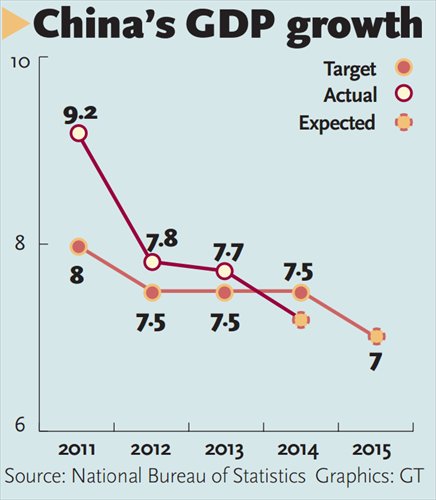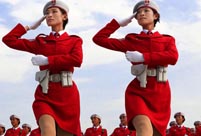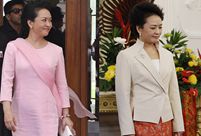 Close-up view of August Aerobatic Team
Close-up view of August Aerobatic Team
 Goddesses married in 2014
Goddesses married in 2014
 Polar region photos raise worldwide awareness of global warming
Polar region photos raise worldwide awareness of global warming
 Get off at the last stop — Beijing Subway in vision
Get off at the last stop — Beijing Subway in vision
 Top 100 beauties in the world!
Top 100 beauties in the world!
 Gallery: Who is the most beautiful one?
Gallery: Who is the most beautiful one?
 If you like autumn, put your hands in the air!
If you like autumn, put your hands in the air!
 Fan Bingbing's "Queen style" in new play
Fan Bingbing's "Queen style" in new play
 Lingerie show at 2014 Miss China
Lingerie show at 2014 Miss China
 J-10 fighters show aerobatic stunts in smog-free sky
J-10 fighters show aerobatic stunts in smog-free sky
 |
| Graphics: GT |
China is expected to lower its growth target for the first time in three years at a key economic conference, analysts said, but predict more pro-growth measures next year.
The Central Economic Work Conference (CEWC), an annual gathering of Chinese policymakers that maps out the country's economic priorities for the coming year, opened on Tuesday, the Xinhua News Agency reported.
The closing date of the conference, which was not announced in advance, was not revealed by Xinhua. But a China Business News (CBN) article published on Tuesday said this year's CEWC is scheduled to run through Thursday, citing sources with knowledge of the matter.
Last year's CEWC began on December 10 and ended on December 13 with a statement calling for deepening reforms and steering a steady growth path.
At the 2014 conference where clues for next year's growth target will be revealed, the interpretation of economic policies and reform measures under the "new normal" conditions might be discussed for the first time, unidentified official sources were quoted as saying in the article.
In May, President Xi Jinping said during an inspection tour of Central China's Henan Province that China's economy needs to adapt to a new normal status, meaning an economic upgrade along with slower growth.
Implementation of the "One Belt and One Road" (Silk Road Economic Belt and the 21st Century Maritime Silk Road) project proposed by Xi during his visits to Kazakhstan and Indonesia in 2013 is also likely to be one of the main themes of the conference, the CBN report disclosed, adding that a flurry of reform measures covering areas including foreign trade, banking, finance and taxation would also be tackled.
Ramped-up reforms in fields that involve the State sector, pricing mechanisms, urban and rural real estate markets and the administrative system might also be among the areas to be discussed, Xu Hongcai, the director of the Department of Information under the China Center for International Economic Exchanges (CCIEE), a Beijing-based think tank, told the Global Times on Tuesday.
Economists interviewed by the Global Times on Tuesday agreed that policymakers may decide on a less ambitious growth target for next year at the CEWC. The growth target may not be formally unveiled until March when the annual legislative and advisory sessions will be held.
The GDP target for 2015 is likely to be lowered to just above 7 percent from this year's 7.5 percent target, Yao Jingyuan, the former chief economist of the National Bureau of Statistics (NBS), told the Global Times.
Fu Bingtao, a senior analyst at the Agricultural Bank of China (ABC) in Beijing, also believes China is set to cut its annual growth target to about 7 percent for 2015.
China's economy expanded at its weakest pace in more than five years in the third quarter - growing by 7.3 percent year-on-year based on NBS data - and the world's second-largest economy is likely to miss this year's target, its lowest growth rate since 1990.
A key Communist Party of China (CPC) meeting held ahead of the CEWC also provided a glimpse of a possible downward revision.
China will actively adapt to the economy's new normal, keeping growth within a reasonable range while focusing on economic restructuring, according to a statement issued after a Friday meeting of the Political Bureau of the CPC Central Committee, chaired by Xi.
Nomura Securities economists, who also forecast a reduction in the GDP target to 7 percent, said in an e-mail to the Global Times Monday that "Even achieving a lower 7 percent growth target in 2015 will require further policy adjustments because of growing risks to the economy." They added they foresee more government stimulus.
They predicted that throughout 2015 there will be one more drop in interest rates and four cash cuts that lenders are required to set aside as reserves, coupled with a wider deficit in the central government budget.
In anticipation of milder tweaks to the monetary policy, ABC's Fu said there might be one cut in the reserve requirement ratio, as well as rate cuts.
Still, growth of above 7 percent would be acceptable, which means the economy will be focused more on quality and would provide more leeway for the country to cope with overcapacity in industries such as steel and cement, CCIEE's Xu said.
Adding to already gloomy data, analysts expect upcoming figures on investment and inflation to be similarly lacklustre, and the property market is likely to remain weak well into 2015, weighing on demand for everything from furniture and glass to cement and steel, according to a Reuters report.
 20 years on: Relocated Three Gorges residents through lens
20 years on: Relocated Three Gorges residents through lens PLA HK Garrison veterans leave behind beautiful smiles
PLA HK Garrison veterans leave behind beautiful smiles Representative beauties of each province in China
Representative beauties of each province in China Chestnut girl goes viral online
Chestnut girl goes viral online Victoria's Secret Fashion Show
Victoria's Secret Fashion Show In photos: Bright and brave female soldier of PLA
In photos: Bright and brave female soldier of PLA China's charming first lady
China's charming first lady Excellent photos of Zhuhai Air Show
Excellent photos of Zhuhai Air Show China's heavyweight aircraft
China's heavyweight aircraft Adding holidays will increase happiness
Adding holidays will increase happiness China’s homegrown gay hookup apps seen as cash cows
China’s homegrown gay hookup apps seen as cash cows Ivory e-sales flourish
Ivory e-sales flourish Foreign firms not being singled out in antitrust campaign: officials
Foreign firms not being singled out in antitrust campaign: officialsDay|Week|Month